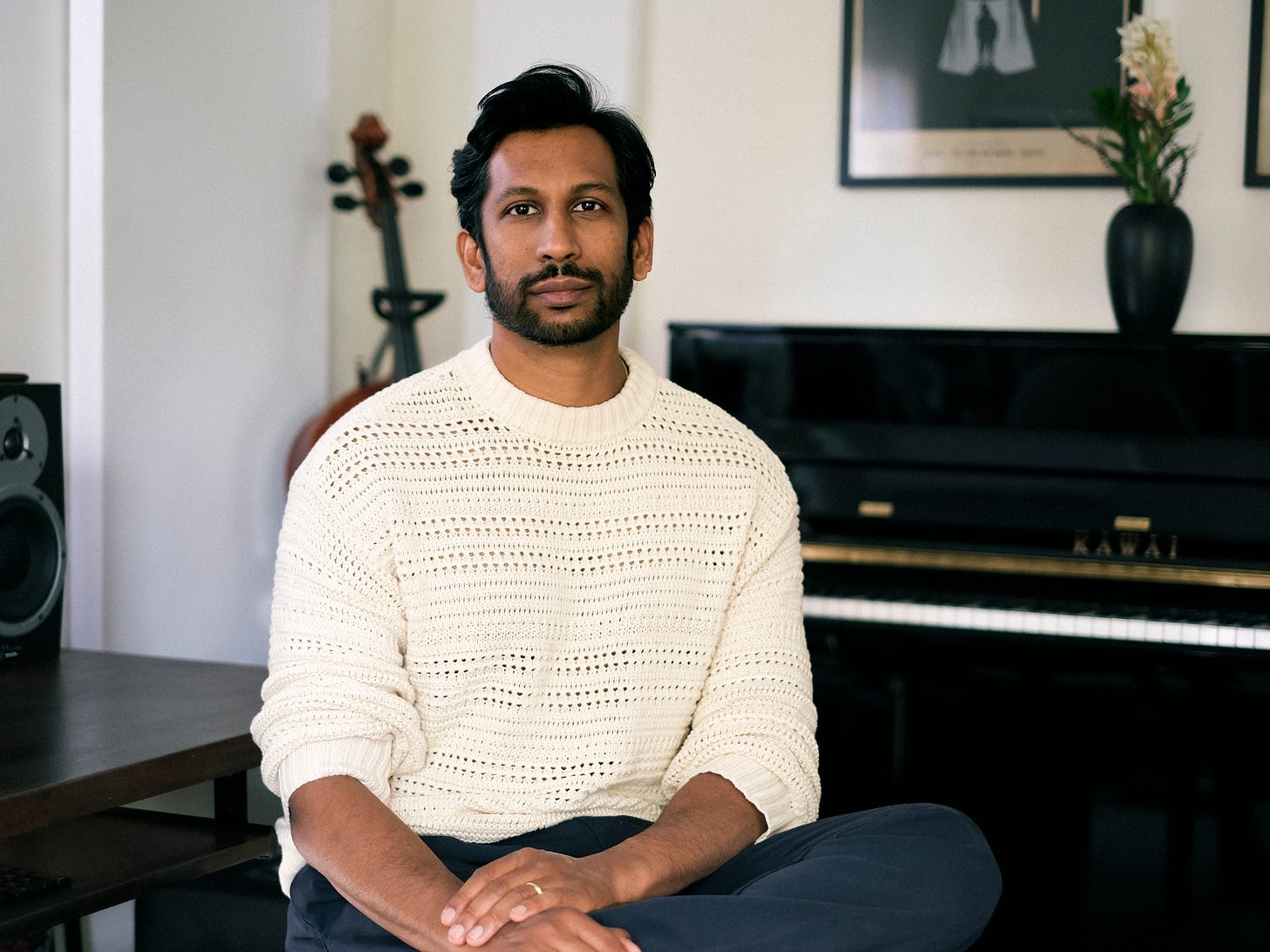Herb Sundays 52: Hrishikesh Hirway
The musician and Song Exploder host with a memory-rich tableau: "When I was growing up, my parents played Hindi songs on Sunday mornings..."
herb sundays 52: Hrishikesh Hirway - apple / spotify. art by Cina.
Hrishikesh Hirway is a singer/songwriter/producer, and the creator and host of Song Exploder, an award-winning podcast/Netflix television series where musicians break down the creative process behind their songs, among other shows. His most recent EP, Rooms I Used to Call My Own features collaborations with Jay Som, Yo-Yo Ma, and producer John Congleton. A quick email search reminded me that I’ve been acquainted with Hrishikesh since the mid-’00s, and he’s been a big supporter of Ghostly over the years, featuring songs we released on his show by Tycho and Tobacco, and remixing Lusine under his Moors alias, a project with rapper and beloved actor Lakeith Stanfield. It has been a thrill to watch him find his voice, both musically and in his podcast/journalism work which has become so well known.
The skill Hrishikesh exhibits with his guests allows for the stories he gets and it’s the benefit of how little of himself he leaves in the end. It’s a deft maneuver and makes the podcast feel more like a fireside chat, but with some major details that you’d never get without a conversation. It’s also often less about the “meaning” of a song and more about the process, like a cooking show. The only similar media I remember are the Classic Albums docs (you can find on amazon streaming or youtube), a British series where they would often expose the “multi-tracks” for great records and show how all the parts came together.
And then there’s the voice. Hirway’s voice is an amazing tool, and because he doesn’t overuse it, it’s extremely enjoyable. Near the closing of each show, there’s a pregnant pause before he plays the full song and he drops the “and now, here’s *song* by *artist” in its entirety.” It makes you wanna holler/take a shot, etc.
What I also enjoy about the show/concept is that it demystifies the creative process but in the service of making you MORE of a fan, instead of less. It eschews the “lone genius” myth of music in favor of showing how music is indeed collaborative and often accidental. The Mobb Deep “Shook Ones” episode show turns into an ode to its lost MC, the Billie Eilish one is about sibling-dom and mental health, and the Rick Astley episode is about how studios work, the tyranny of marketing, and chance. Each song is a labyrinth of decisions around sound, technology, and ultimately some ineffable “rightness” that great artists have a sense for.
Regarding the playlist, Hrishikesh had this to say:
“Making this mix put me deep into my memories. When I was growing up, my parents played Hindi songs on Sunday mornings until the afternoons. My favorites were the ones from the 1960s, the end of the Golden Age of Bollywood. I haven’t seen most of the movies that these songs come from, and I can’t even speak Hindi, but I love these songs deeply and they’ve been an enormous influence on me. I feel something generational when I listen to the beautiful, intricate voices of Asha Bhosle and Lata Mangeshkar and the warm, familiar sweet voices of Mohammed Rafi and Kishore Kumar. There was a time in my childhood when I hadn’t yet gotten to know one of my uncles, my mother’s youngest brother, but from stories I heard about him, I sometimes imagined him having Mohammed Rafi’s voice. The smile you can hear when he sings.
When I was in college and didn’t have the experience of hearing these songs through my parents’ listening habits, I asked any relatives visiting from India to bring me CD compilations of songs from the 60s. India loves making compilations! So I had CDs like “Golden Duets of Asha Bhosle” and “Mohammed Rafi - Timeless Classics.” I’ve lost track of those CDs, but this mixtape is my way of recreating some version of them.
I’m not sure if any of your other subscribers besides me are going to want an hour and forty-five minutes of tape-saturated, extravagantly arranged numbers from Indian musicals, but thanks for giving me a reason to put these together.”
The other reason why I love Song Exploder is that it shows you how hard artists work to get their work right at a time when the cheapening of artistic labor seems to be hitting a crescendo with the AI discussion that is swirling in my feeds.
I lamented to a friend that I felt lame that I was so irked by this wave of AI art ( both aesthetically and conceptually) and that I felt hypocritical as someone who has used a lot of my time to propagate and endorse technology as a vital part of art. He reminded me that what our group of friends actually likes is how humans use tools and the finesse of getting your voice across even with inscrutable or abstract means. It’s the process that is exciting, and the output is the result of humanity making choices, often a roll of the die.
“Doing my own research” types have taken politics, medicine, and news journalism down a peg. I often think art is the last column and that it’s falling fast. Of course, an “AI artist” is desirable for corporations (controllable and cheap), and of course, it’s appealing visually in a way the worst of NFT dreck is, as it’s just the language of the internet fed back to us, all familiar and meme-y which you could argue is indeed the language of our time, but it often feels like cereal milk or bland cloudy runoff.
Good art always reveals more with time. Said differently, good art doesn't give you everything upon first impression. Everything the commercial internet wants from us is about speed. This won't change anytime soon, so personal value systems are essential, even if unpopular. Since to some degree, all art now is about technology and who has access to it, we need to democratize the tools to see its potential, which seems to be happening.
Despite my cynicism, artists always prevail and upend expectations, so I stay interested. Artists using AI are already becoming commonplace, and we need great artists to unlock the explosive potential of the tech and point out the darker truths of the space, in a way no one else can or will.






